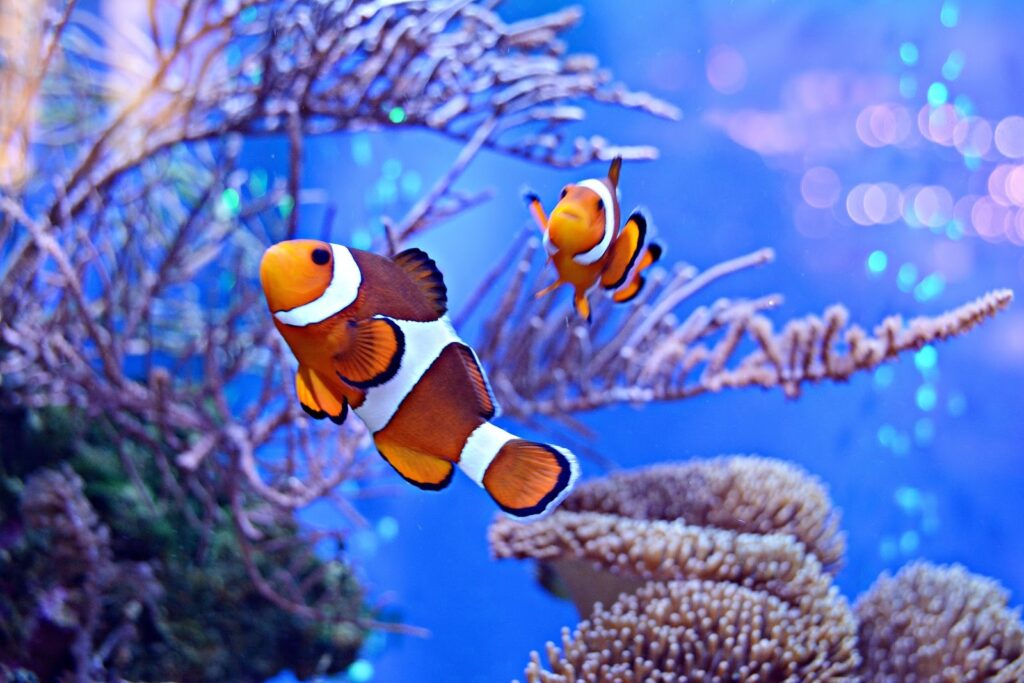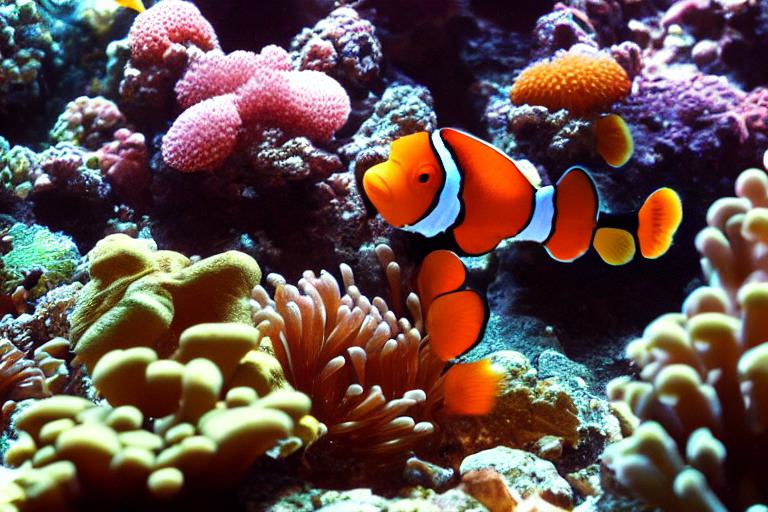Clownfish are a popular choice for saltwater aquariums because of their vibrant colors and relatively low maintenance. But how long do these fish live if cared for properly? In this article, we’ll explore the lifespan of clownfish and what factors impact their longevity. We’ll also provide some tips on how to keep your clownfish healthy and happy for as long as possible.

How To Make Sure Your Clown Fish Live Long?
You can find specially formulated clownfish food at your local pet store. This means feeding them a variety of foods that are high in nutrients. When it comes to clownfish, there are a few things you can do to ensure they have a long and healthy life. First, it’s important to provide them with a good quality diet.
This means performing regular water changes and making sure the filter is working properly. Second, you’ll need to keep their tank clean. A dirty tank can lead to all sorts of health problems for your clownfish.
This means choosing an aquarium that is the right size for your clownfish and stocking it with plenty of live rock and other hiding places. Finally, it’s important to provide them with a good quality aquarium. A well-equipped and well-maintained aquarium will go a long way in keeping your clownfish healthy and happy.
Get a Decent Sized Tank
A clownfish can grow to be about 4 inches long. A clownfish needs a minimum of 10 gallons, but 20 gallons is better, and 30 gallons or more is ideal.
A clownfish needs a minimum of 10 gallons, but 20 gallons is better, and 30 gallons or more is ideal. One of the most important things to remember when keeping clownfish is that they need a decent sized tank. A clownfish can grow to be about 4 inches long, so it is important to make sure that they have enough room to swim and grow. Clownfish are some of the most popular fish kept in home aquariums. They are relatively easy to care for, and can live for a long time if they are given the proper care.
Provide Proper Water Conditions
Clownfish are a saltwater fish that are popular in home aquariums. They are relatively easy to care for, but there are some things you need to do to ensure they have a long and healthy life.
This means maintaining the correct temperature, salinity, and pH levels. One of the most important things to do is to provide proper water conditions. It’s also important to have a good filtration system in place.
However, if you don’t provide proper care, they may only live for 2-3 years. If you provide proper water conditions and care for your clownfish properly, they can live for 5-10 years.
So, if you want your clownfish to have a long and healthy life, be sure to provide them with proper water conditions.
Never Keep Non-Compatible Tank Mates
They are also very territorial, so it’s best to only keep one clownfish per tank. In the wild, clownfish live in anemone reefs and rely on the anemone for protection. If you’re thinking about keeping clownfish as pets, you should know that they are not compatible with just any other fish.
Clownfish are also known to be aggressive towards other fish, so it’s important to choose their tank mates carefully. Some compatible fish include damselfish, dottybacks, and certain wrasses. incompatible fish include triggerfish, pufferfish, and eels.
Anemones are the perfect place for clownfish to hide, but you can also use rocks and coral. It’s also important to provide plenty of hiding places for your clownfish, as they like to have a lot of places to hide.
If you provide a proper environment for your clownfish, they can live for 6-10 years.

What Type Of Tank Setup Do Clown Fish Need?
Clownfish are also relatively easy to care for, but there are still some things you need to know in order to keep them healthy and happy. Clownfish are a type of saltwater fish that are native to the Indian and Pacific Oceans. They are a popular type of fish to keep in home aquariums because of their vibrant colors and interesting patterns.
They need a saltwater tank with plenty of live rock for hiding and grazing. Clownfish also need a good filtration system and regular water changes to keep the water clean and free of toxins. Clownfish are relatively hardy fish, but they still need specific conditions in order to thrive. The water temperature should be between 72 and 78 degrees Fahrenheit and the pH should be between 8.1 and 8.4. One of the most important things to know about clownfish is what type of tank setup they need.
However, if they are not cared for properly, they may only live for 2 to 3 years. So, it is important to do your research and make sure you are providing your clownfish with everything they need to live a long and healthy life. If you provide your clownfish with the proper tank setup and care, they can live for 5 to 10 years.
Common Diseases That Reduce Clownfish Lifespan
Some common diseases that can reduce clownfish lifespan include: One of the biggest challenges with keeping clownfish is preventing and treating diseases. Clownfish are a popular choice for saltwater aquariums, but they are not always easy to care for.
Ich can be difficult to treat, and often requires multiple rounds of medication. Ich: Also known as white spot disease, ich is caused by a parasitic protozoan. Symptoms include white spots on the fish body, lethargy, and loss of appetite.
Marine velvet: Also called gold dust disease, marine velvet is caused by a parasitic dinoflagellate. Marine velvet is difficult to treat and often requires multiple rounds of medication. Symptoms include gold or yellow dust on the fish body, lethargy, and loss of appetite.
Cryptocaryon is difficult to treat and often requires multiple rounds of medication. Symptoms include white spots on the fish body, lethargy, and loss of appetite. Cryptocaryon: Cryptocaryon is a parasitic protozoan that causes a disease known as marine white spot disease.
These are just some of the common diseases that can reduce clownfish lifespan. If you suspect your clownfish is sick, it’s important to take them to a vet or experienced aquarium keeper for diagnosis and treatment.
Proper Diet Is Essential For Clown Fish
In the wild, clown fish feed on zooplankton, small crustaceans, and algae. A clown fish’s diet is just as important as its environment when it comes to its lifespan. In captivity, they should be given a diet that replicates their natural diet as closely as possible.
A good diet for a clown fish includes live or frozen foods like brine shrimp, mysis shrimp, and bloodworms. These foods should be supplemented with a high-quality flake or pellet food that is rich in marine algae and other plant matter.
A varied diet will also help to keep your clown fish healthy and active. It is also important to feed your clown fish a variety of foods to ensure that they are getting all the nutrients they need.
By providing them with a diet that replicates their natural diet as closely as possible, you can help them to stay healthy and active for many years to come. Proper diet is essential for clown fish to live a long and healthy life.
Frequently Asked Questions
1. How long do clownfish live if cared for properly?
Clownfish can live for up to 10 years if cared for properly. However, the average lifespan of a clownfish is only about 3 to 5 years.
2. What factors affect how long a clownfish will live?
There are several factors that can affect how long a clownfish will live, including diet, water quality, and tank mates.
3. What is the best diet for a clownfish?
A clownfish’s diet should consist of a variety of small invertebrates, such as shrimp, crabs, and worms. They should also be given a quality flake food or pellet food designed for marine fish.
4. What water quality parameters are important for clownfish?
Water quality is important for all fish, but it is especially important for clownfish. They should be kept in water that is clean and well-filtered. The water temperature should be between 75 and 82 degrees Fahrenheit.
5. What are some common tank mates for clownfish?
Some common tank mates for clownfish include damselfish, dottybacks, and wrasses. It is important to choose tank mates carefully, as some fish can be aggressive towards clownfish.
6. What are some signs that a clownfish is not healthy?
Some signs that a clownfish is not healthy include lethargy, lack of appetite, and unusual behavior. If you notice any of these signs, you should take your clownfish to a veterinarian who specializes in fish.
7. What are some common diseases that affect clownfish?
Some common diseases that affect clownfish include marine ich, marine velvet, and clownfish disease. These diseases can be fatal, so it is important to be aware of the signs and to seek treatment from a qualified veterinarian.
8. How can I prevent my clownfish from getting sick?
There are several things you can do to help prevent your clownfish from getting sick, including maintaining good water quality, keeping them well-fed, and choosing tank mates carefully.
9. What should I do if my clownfish does get sick?
If your clownfish does get sick, the best thing to do is to take them to a veterinarian who specializes in fish. They will be able to diagnose and treat the disease.
10. Are there any special considerations for caring for a clownfish?
Yes, there are a few special considerations for caring for a clownfish. They are sensitive to changes in water quality and temperature, so it is important to make any changes slowly. They also need to be fed a variety of small invertebrates, so it is important to have a good supply of live food on hand.
Final thoughts
If you are considering a clownfish as a pet, you may be wondering how long they live. Clownfish are a hardy species and can live up to 10 years if they are cared for properly. They are a relatively low-maintenance pet, but there are a few things you will need to do to ensure their long life. First, you will need to provide them with a clean and spacious tank. They also need a diet of fresh seafood and a regular supply of live coral or algae. With proper care, your clownfish will bring you years of enjoyment.
